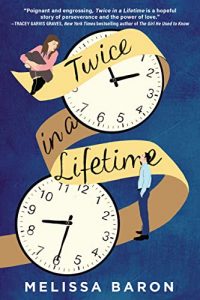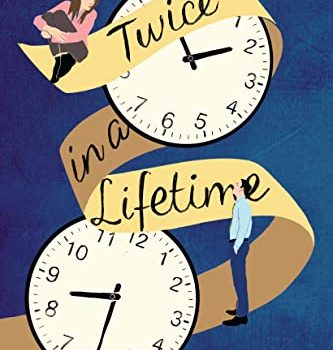Alexandra Pierce Reviews Twice in a Lifetime by Melissa Baron
 Twice in a Lifetime, Melissa Baron (Alcove Press 978-1-63910-136-8, $17.99, 336pp, tp) December 2022. Cover by David Drummond.
Twice in a Lifetime, Melissa Baron (Alcove Press 978-1-63910-136-8, $17.99, 336pp, tp) December 2022. Cover by David Drummond.
The blurb suggests that this debut novel is ‘‘The Time Traveller’s Wife meets Oona Out of Order’’, but the premise is unlike either of those: there is no genetic condition and no hopping around in time. Rather, Melissa Baron is using an idea familiar from the 2006 film The Lake House: two people communicating across time. In the film, it was via letters in a mailbox; here, it’s text messages. It’s a romance novel; it’s also (what seems like) an honest portrayal of living with anxiety and depression, and how to build a good life in a new place.
Before Twice in a Lifetime opens, the author notes that the book contains ‘‘depictions of death, depression, anxiety, and suicidal thoughts,’’ and that there are resources at the back of the book should the reader need them. This gives a good indication about the content of the story, since Isla, the main character, has an anxiety disorder and depression, sometimes resulting in panic attacks, and on one occasion a suicide attempt. These are not things I have experienced myself, so I found out more about the author who, it turns out, experiences anxiety and depression, so I assume this is accurate to her experiences, at least.
Isla has moved away from Chicago after a breakdown; she now lives in a tiny cottage outside St. Louis, working as a graphic designer and figuring out what life can look like. A few months in, she receives a text message addressed to ‘‘Buttercup,’’ to which she kindly replies ‘‘you have the wrong number.’’ This starts a text message thread that gets weirder as the other person insists it’s the right number, and they turn out to know a great many details about her life. Isla is, understandably, disturbed by this, and she eventually stops answering; but she doesn’t block the number, meaning that the sender can text again. And does. All of which sounds like the beginning of a horror novel, but instead it’s where the romance starts: the sender claims to be Isla’s husband. Since she hasn’t dated for a very long time, this is clearly ridiculous, but Isla keeps answering the texts and as the sender keeps providing more evidence that he knows her, she starts to find comfort in his messages.
There are two levels of suspension of disbelief required to enjoy this novel. The first is around the mechanics of the story: that text messages can be sent between two different time periods, although only from one specific location. There is no attempt at explaining this, which is probably a good thing, since the intention is clearly to suggest it’s all about the power of love. The second is that Isla would find a stranger texting her, knowing personal details and even having photos of her, romantic rather than deeply creepy and troubling. She does acknowledge that it’s weird, and considers blocking the number; but she doesn’t. As with not explaining the time-travelling messages, there’s no explanation for this, but this is the more troubling omission.
Actually, there’s a third problem I had with the novel: the consequences of changing the past. Ewan, the texter, eventually reveals that Isla-in-the-future has died, and that this is related to an accident that Isla-in-the-now hasn’t had yet. They therefore figure out how to prevent the accident, which of course has repercussions… but only for the two of them, and only around how they meet. Of course, if you think too long about changing the future and the inherent paradoxes you’re liable to end up with a migraine (or maybe that’s just me), so maybe this doesn’t need to be examined too closely. But for a reader with any background in time-travel stories, this may be problematic.
These caveats make it sound like I didn’t enjoy Twice in a Lifetime. Truly, I did – once I got past the aspects I’ve mentioned (which I suspect not everyone will be able to do). The romance in the story, when it’s finally in the real world and not via text message, isn’t overly schmaltzy. Isla has a real life outside of her relationship with Ewan; I appreciated the story around her building a life for herself in a new place, and figuring out coping mechanisms to improve her mental health, including therapy as well as other methods. They don’t work perfectly – there is no magical cure – but it does feel realistically hopeful, and Isla’s friends continually accept her for who she is, as she is. That, too, is a precious sort of love.
Alexandra Pierce reads, writes, podcasts, cooks and knits; she’s Australian and a feminist. She was a host of the Hugo Award winning podcast Galactic Suburbia for a decade; her new podcast is all about indie bookshops and is called Paper Defiance. Alex has edited two award-winning non-fiction anthologies, Letters to Tiptree and Luminscent Threads: Connections to Octavia E Butler. She reviews a wide range of books at www.randomalex.net.
This review and more like it in the December 2022 issue of Locus.
 While you are here, please take a moment to support Locus with a one-time or recurring donation. We rely on reader donations to keep the magazine and site going, and would like to keep the site paywall free, but WE NEED YOUR FINANCIAL SUPPORT to continue quality coverage of the science fiction and fantasy field.
While you are here, please take a moment to support Locus with a one-time or recurring donation. We rely on reader donations to keep the magazine and site going, and would like to keep the site paywall free, but WE NEED YOUR FINANCIAL SUPPORT to continue quality coverage of the science fiction and fantasy field.
©Locus Magazine. Copyrighted material may not be republished without permission of LSFF.








